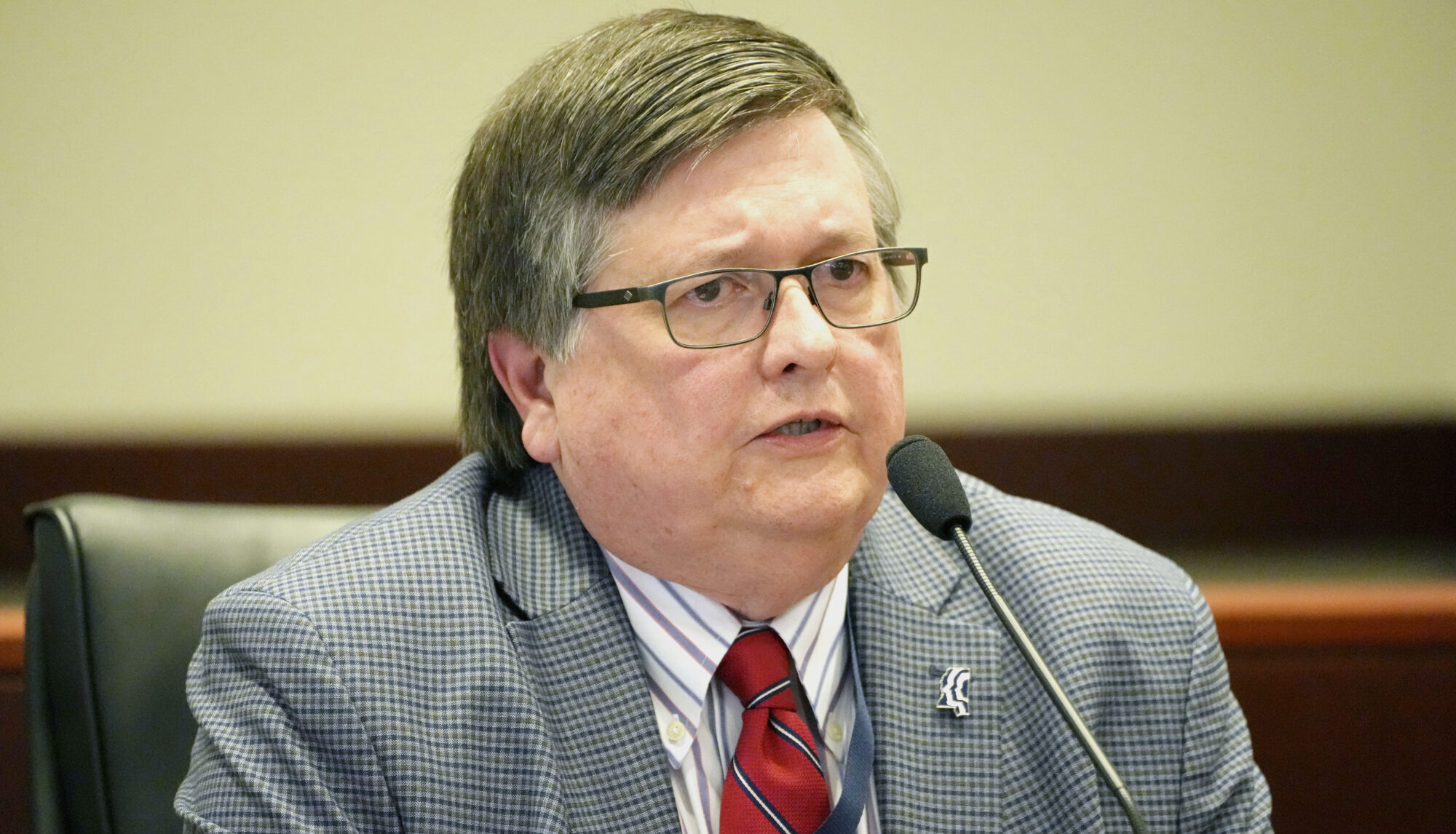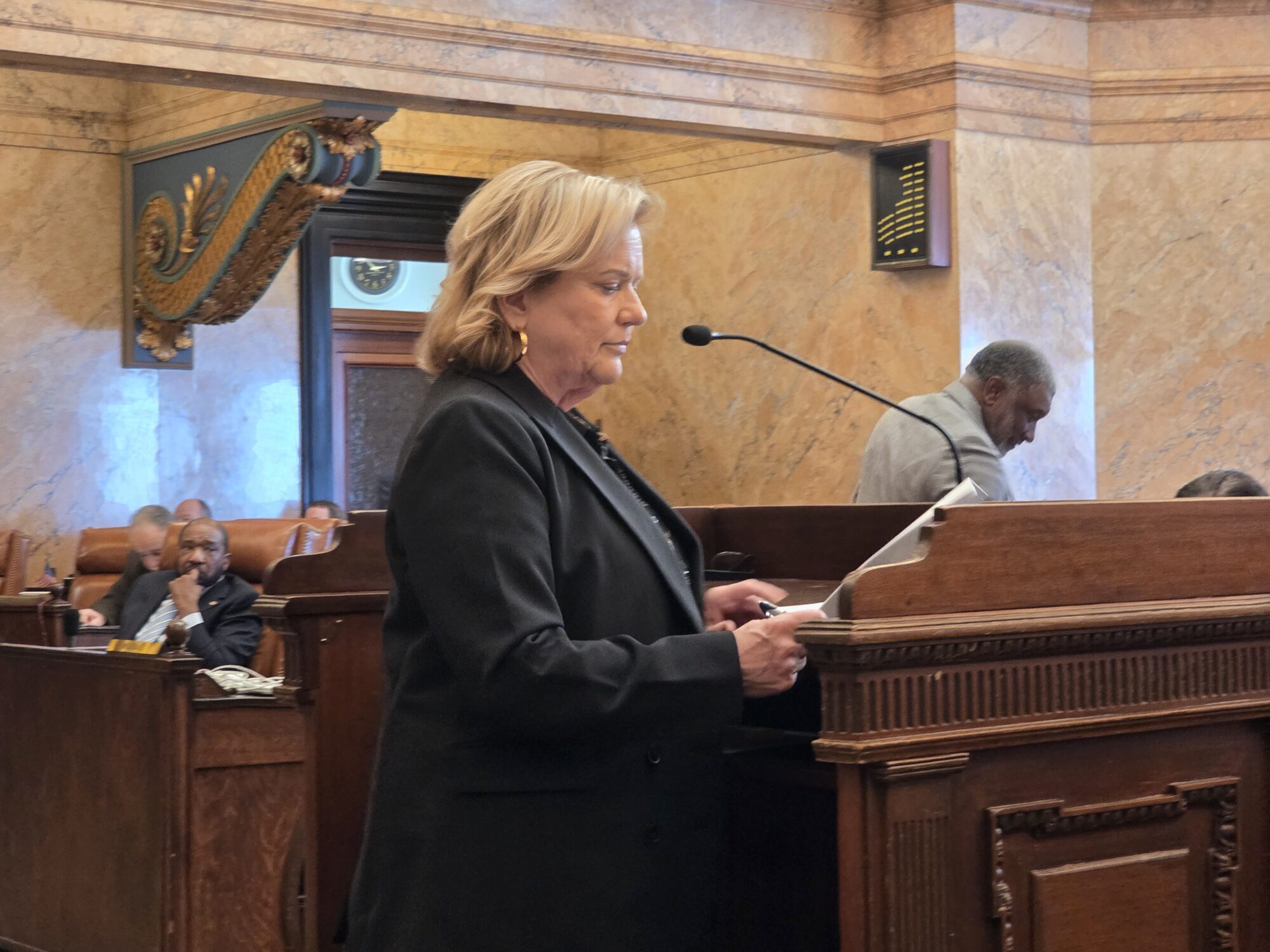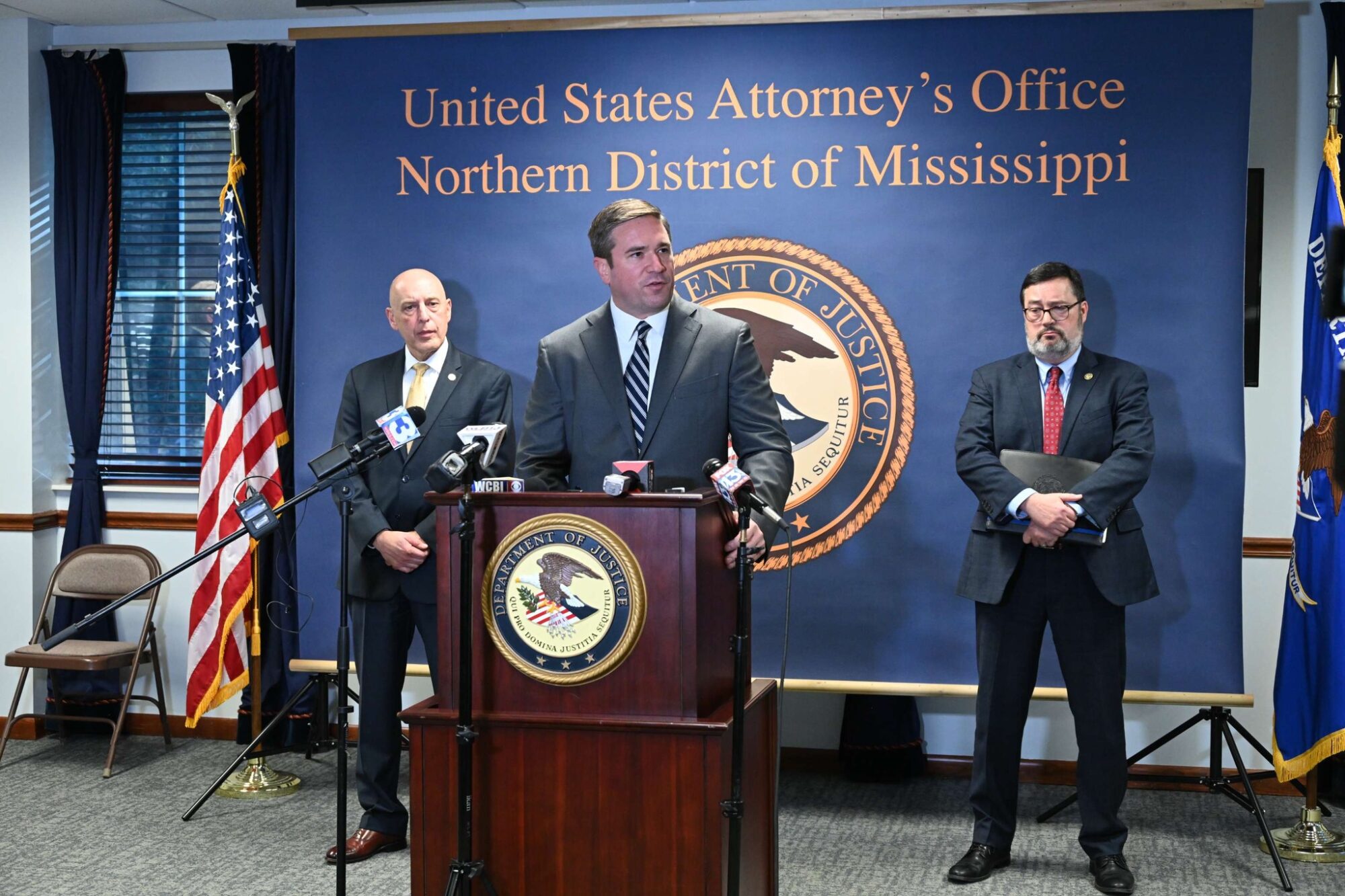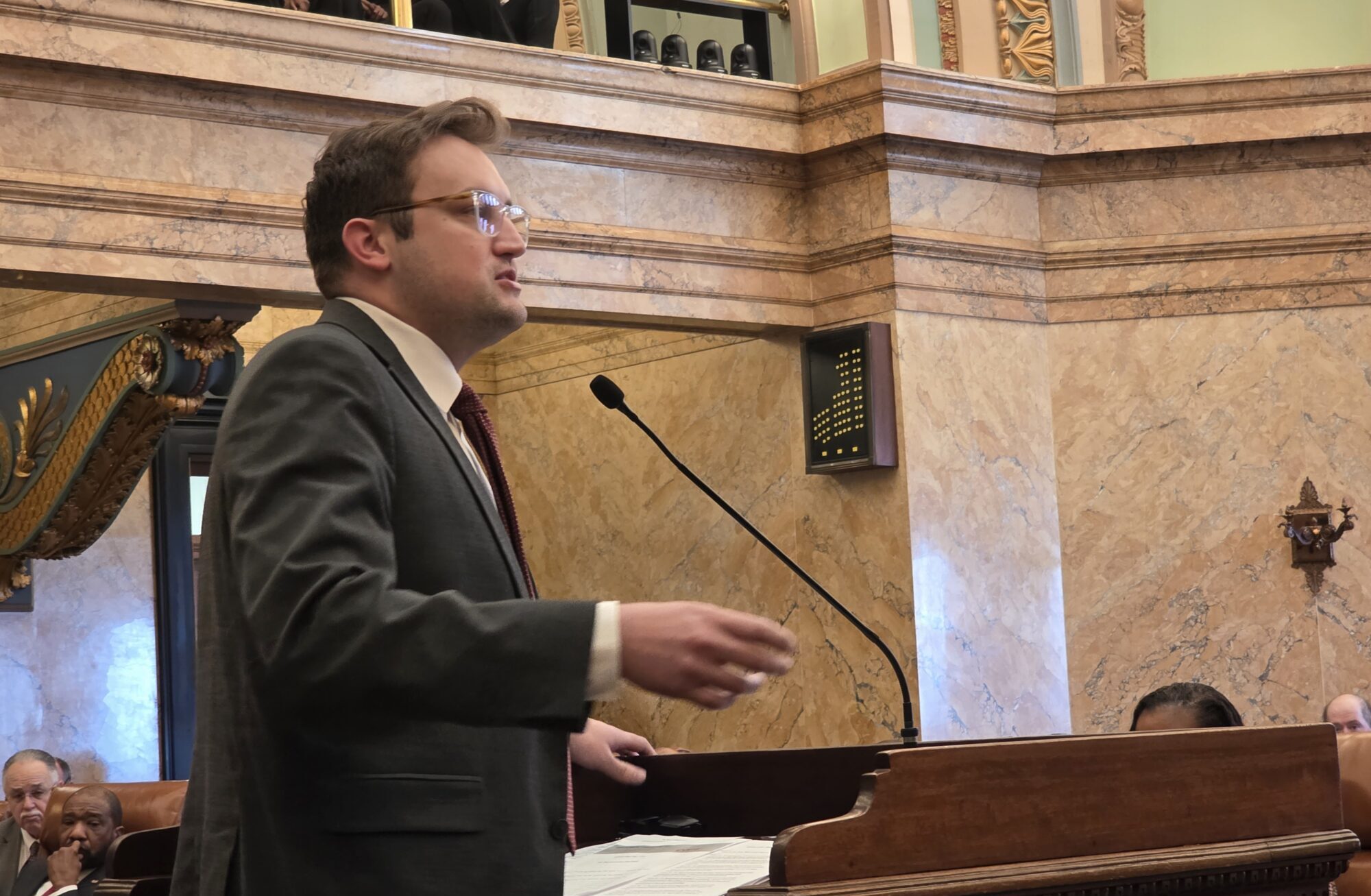Rising costs, inflation negatively affecting Mississippians’ health, Senate committee told

Mississippi State Health Officer Dr. Daniel Edney, addresses members of the Mississippi Joint Legislative Budget Committee during his budget presentation for the state Department of Health, Friday, Sept. 29, 2023, in Jackson, Miss. (AP Photo/Rogelio V. Solis)
Listen to the audio version of this article (generated by AI).
- The Mississippi Senate Insurance Study Committee is gathering information ahead of the 2026 session as members consider potential legislation.
Various speakers at Wednesday’s state Senate Insurance Study Committee told members that negative health outcomes of Mississippians are largely a result of rising insurance costs.
State Health Officer Dr. Daniel Edney gave an overview of Mississippians’ health, which he said is resulting in a decline in population due to several factors.
Each year since 1950 the state has seen an increase in the number of deaths to the point that Mississippi has a higher mortality rate than the U.S. average. Had the state ranked average in health outcomes over that period, about 280,000 more people could be alive today, Edney said.
“And that didn’t factor in the fact of babies dying unnecessarily, who did not have a chance to reproduce, not factoring in children dying, young people dying of accidents,” Edney added.
Taking those factors into account, it would bring the total to more than 300,000 people, basically equating to another congressional district for the state.
“The state of the population of Mississippi is artificially low, because our health outcomes are so poor,” Edney said.
In addition to the mortality rate, Mississippi’s birth rate is declining to the point that in 2023 the number of deaths exceeded live births. Edney called on the Legislature to put the same level of focus on health as has been put on education in recent years.
“If we can improve health the way that, altogether, we have improved education you’re going to impact poverty and I think that’s a certainty,” Edney said.
Access to care is a major factor in the rankings, not simply insurance coverage alone. However, insurance plays a major factor in access beyond free clinics, with transportation also being a factor especially in rural areas.
Federal marketplace subsidies implemented during the COVID era have played a role in narrowing the coverage gap but because those are expected to expire, Edney expects the coverage gap to begin expanding again.
“When a low-income worker who’s not used to having insurance gets health insurance, it is revolutionary in their life,” Edney said of the importance of insurance.
As the legislature moves into the 2026 session, Edney asked the Senate to fully fund Medicaid. He said that without Medicaid the entire healthcare system in the state would be negatively affected, adding that the program is currently the primary financial supporter of hospitals in Mississippi. Edney said Medicaid pays on time and without hassle.
“Without Medicaid, we don’t have healthcare in this state,” Edney said. “And Medicaid is funding the majority of care in rural Mississippi, and so this why Medicaid is extremely important to the healthcare infrastructure of this state.”
Edney stopped short of supporting Medicare expansion, but said full funding to the program makes sense since it still entails a 3 to 1 drawdown for the state.
Dental Coverage
Dr. Charles Belknapp, President of the Mississippi Dental Association, said oral care is just as essential, if not more so, as general health care since everything that goes into the human body passes through the mouth. Currently, dental insurance coverage is not as comprehensive as most medical coverage, as policy providers can elect to opt out of specific kinds of care, especially higher cost care.
One factor affecting dental care over the last five years has been inflation, which has impacted costs to dentists’ offices. However, insurance payments have not kept pace. There are also concerns over “administrative costs.”
“We would like to support legislation requiring dental benefit transparency reporting,” Belknapp said. “We want to ensure funds go directly to patient care, not excessive overhead.”
Legislation Belknapp hopes to see would set a dental loss ratio transparency model similar to Louisiana’s that passed in July. Eight other states have similar transparency laws. The aim would be to compare how much money is spent for premiums compared to the amount provided to deliver dental care. Belknapp said variations range from 23 percent to 90 percent of premiums going to care within individual and group plans.
“We think that 90 percent for every dollar provided back in return for dental plans, or for dental benefits, is important for the patient,” Belknapp said.
State Senator Hob Bryan (D) asked that if since the ACA set requirements mandating 85 percent of health insurance premiums be paid for healthcare, if the same regulation applies to dental plans. Belknapp said to his knowledge that is not the case, and the current lack of reporting requirements provide no incentive for dental insurance companies for that purpose. He believes the transparency will not only ensure most of a premium goes to care but also increase competition in the market.
“Because right now, there’s nothing free about our free market system for general insurance in the state and this true transparency is needed to be able to see what is going on to shed a light on that,” Belknap described.
Lobbyist’s agenda for the coming session
A lobbyist representing the Mississippi Association of Health Plans also spoke to the committee to discuss the driving factors leading to higher rates.
Drew Maddox described how family and group plans are the fastest rising policies, with individual coverage also rising but not as fast. GLP-1 drugs, specialty medications, biosimilars (generics), an increasingly aging population, chronic conditions and diabetes are driving up costs.
GLP-1 drugs are typically used for treatment of diabetes, but most recently have gained traction in weight loss.
“We’re seeing huge spikes and people taking those for non-diabetic situations,” Maddox described, later stating long term use seems to drive negative health outcomes in non-diabetic patients.
Specialty medicines are very expensive drugs usually administered monthly, while chronic conditions can include everything from diabetes to behavioral health. Maddox said that as people live longer, that larger aging population costs more. Other factors include the cost to treat cancer and the labor cost of health care which rose due to the pandemic and inflation.
Maddox also touched on the topic of Pharmacy Benefit Manager, or PBM, reform, which was considered by the Legislature last session, but did not come to fruition. He said that while the association agrees transparency and oversight are good things, they have reservations.
“I will say our line in the sand is on pricing,” Maddox explained. “We don’t believe that the government should… insert itself in any sort of pricing.”
The association also disagrees with the government coming between two contracting parties. Maddox said that patients are pushed to specific pharmacies to keep prices low.
A piece of legislation the association will work to pass this session will be in the realm of emergency transport. The aim is to address an upside-down billing rate in the code, which leads to unmitigated costs that are passed down to the patient’s policy pricing. The association plans to ask to flip the rate, insert transparency on local contracts, and insert telemedicine into the treat and triage aspect of bussing patients to care.
“If you don’t need a bus on the scene, let’s not send one. Those are expensive,” Maddox said. “If we can have telemedicine work in that scenario, let’s let it work.”
Maddox admits insurance premiums have gone up nearly 400 percent in the last 25 years and while some people will say it is due to greed, he cites inflation, among other things.
“Anybody that has gotten a renewal notice and opened it and read it has probably seen this,” Maddox explained. “I’m pretty scared that it’s going to continue to increase.”
These increases will not only affect those in poverty, but those up to the upper middle class as well. The expectation is that the cost of an unsubsidized plan for a family of four to cost about $30,000. If that family only makes $60,000 annually, that policy become unaffordable.
“I don’t know many Mississippians making $60,000 that can afford to pay 50 percent of (their income).” Maddox described. “We’ve got to come up with some solutions, because otherwise we’re all going to be left out in the cold. “
Insurance Commissioner Mike Chaney (R) added that if federal tax credits are not renewed the number of uninsured will increase to the tune of 200,000 more people, or more due to Medicaid cuts.
“These people will go to uncompensated care at the emergency rooms and it presents a whole host of problems for healthcare in the state,” Chaney described.
If that occurs, Chaney predicts the closure of hospitals, and if PBM reform is not considered, a number of independent pharmacies will also close.
PBM reform
An independent pharmacist also addressed the committee about the need for PBM reform to protect independent pharmacies from closure.
Michael Jones is a pharmacist and owner of one of the last two independent pharmacies in Vicksburg. He said five years ago, the area had five independent pharmacies. Similar trends are happening across the state, such as in Fayette where the last independent pharmacy recently shut its doors.
“So, the people in Fayette, Mississippi now have to go 30 miles to get their medicine,” Jones said. “Just one way to get their medications.”
Jones said his “line in the sand” is when pharmacies are forced to try to fill prescriptions for less than they pay. If a medication costs $12, but fees and clawbacks, also called rate adjustments levied by PBM, make it cost more, putting a financial strain on their ability to operate.
“The simple fact is a business of any sort cannot operate in a deficit. And so, we’re the same way,” Jones described “And it’s sad to see that healthcare has come to the fact that the insurance companies are telling us all what we can do. Obviously, the dental world seems to be facing the same factor we are.”
The biggest impacts come from rate adjustments weeks or months later after the pharmacist has already filled the prescription, which result in the pharmacist losing money on the transaction.
“It’s hard to make sure that you’re getting the correct amount filled on a prescription where you’re not a 100 percent sure what that is,” Jones described.
All told, Jones said PBMs are collecting about $35 million statewide from independent pharmacies in effective rate adjustments and transaction fees.
He asked the Legislature to look to states like Alabama that recently passed laws regulating acquisition costs to at least what Medicaid reimburses.
“So basically, the PBMs now in Alabama cannot pay their independent pharmacies or pharmacies as a whole less than that rate,” Jones described. “And so again, the PBMs do play a major role in the prescription drug supply chain, negotiating the drug prices, handling claims. Independent pharmacies know what we’re facing, and we see it every day. We see what’s being taken from us. And we see how it’s being taken from us.”











